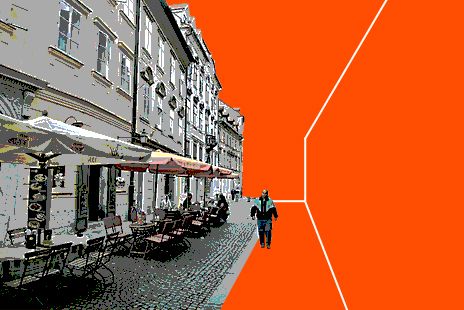
IDEOLOGY
THE SOCIAL ART OF ARCHITECTURE
Buildings make a place, place makes a situation and a situation entices social events, good or bad. In this way, our built environment has a dramatic impact on the quality of our lives, which is why good buildings are so important. Why architecture is so important. Combining the dynamic between building and situation with California’s mythical expectations of prosperity, popularity and nature is not a science, but an art. Values are needed to balance the complexity of the design process that creates architecture. Inevitably, there is imperfection in the process, which leads to flaws—or, in actuality, to soul and character. The Japanese call it wabi sabi. This imperfection is a natural attraction, a place of comfort, a condition to embrace when the situation presents itself, as it reflects our human condition. Architecture is an experiential art, bringing our desires into balance to improve our contemporary home life, work life and community life.
WHAT REALLY MATTERS TO US?
What are the character defining features of being Californian?
What shapes our cultural outlook? How do we balance environmental ethics, an open economy and popular culture? How do we celebrate and promote our outdoor lifestyle?
These questions are all of ours. In the practice of architecture, they become manifest in the design process. When we address these issues through functionality and the art of building, we make architecture—which really does matter, as it defines our character, our culture.
How we strike a balance among these environmental,economic and social concerns is our choice: a character defining moment. This insatiable appetite to find balance is what we do as Californians. And we can find truly progressive and unexpected design solutions when this ambition leads us to an inevitable conundrum. Understanding this conundrum as the threshold for invention is the key to finding an architecture with a soul.
CALIFORNIA'S WEALTH
From the beginning, as far back as 1650, this place has been associated with economic prosperity, open to everyone. It was a fortuitous moment when the Spanish gave name to this land, thinking it was the mythical island of splendor and wealth ruled by Queen Califia. What they found turned out not to be an island, but the name remained. The enduring quest for riches has borne truth from the Gold Rush to an agricultural empire, to an entertainment industry, and on to high technology and world connectivity. The universal attraction to California still carries with it the hope and opportunity for economic fulfillment, which no longer is a myth.
POPULAR CULTURE
The challenge with popular culture is to understand its sources and learn how to navigate within it, while not understating the magnitude of its influence. Maintaining a stable position regarding popular culture is essential, especially in California, where mass–appeal culture has flourished to the point that it actually defines who we are. Everyday, popularity is fed to us through the clutter of advertising, the mass market and the culture of conspicuous consumption. The need to be hip, cool and desirable often devalues the more poignant and practical needs in our lives: the support of family, community and civic life. Decision making about our built environment is not as simple as making the best consumer choice, as it deals with situations and effects, rather then the simple purchase of a product. When we are confronted with making the best and most meaningful decisions to advance our built environment, history is a teacher and a benchmark for progressive choices. And progressive choices are essential when fitting architecture to the shape of California’s constantly changing popular culture.
ENVIRONMENTAL ETHICS
Environmental ethics is not a strange notion to a Californian; it is ingrained in our lives. Here, it dates from the early 1800s, when Abraham Lincoln saw fit to protect the giant sequoia trees from indiscriminate removal in the area we know today as Yosemite. This environmental awareness also captivated the nation when John Muir argued against damming the sister valley to Yosemite, the Hetch Hetchy, and the Sierra Club was born. California has prospered from the water of Hetch Hetchy, and the ethics that matured in these environmental debates has shaped our culture. We know how to recycle, conserve, encourage renewable energies, advocate a clean environment and promote health because Californians live outdoors.
